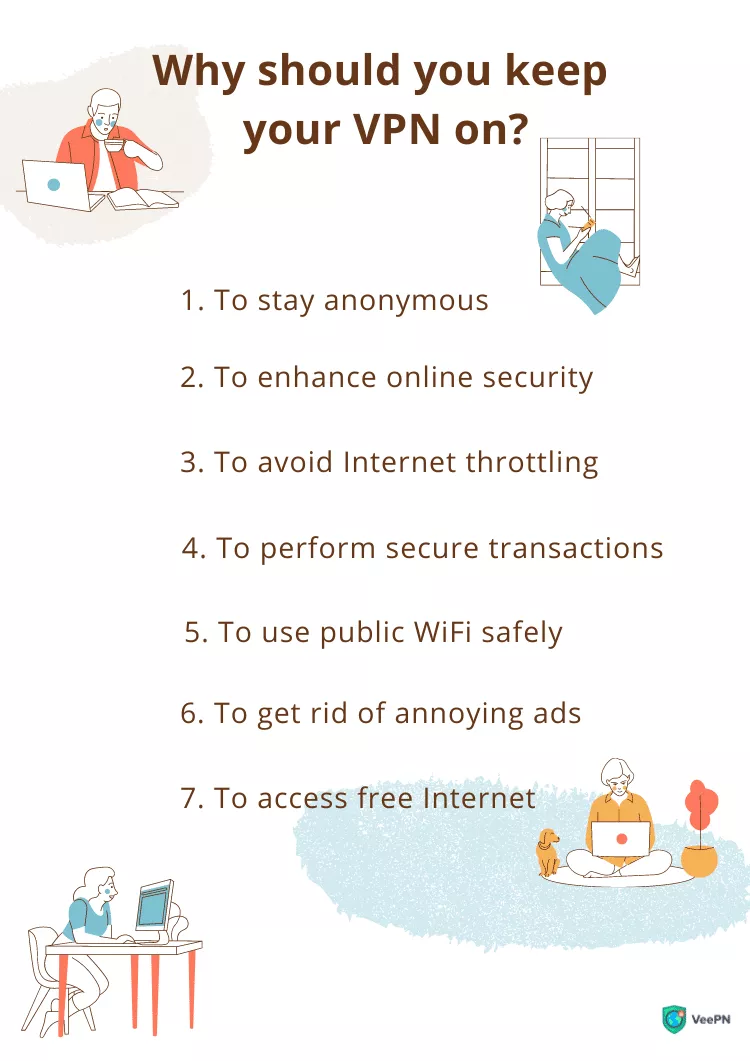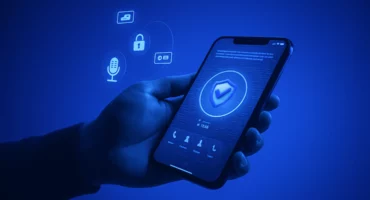Should I Use a VPN All the Time? Here’s When to Turn It Off

Whether at home, in the office, or a public place, your online privacy is important.
And the most efficient way to protect it is a reliable VPN. If chosen wisely, this tool will keep your browsing experience safe and shield your sensitive data from online snoopers, hackers, and Internet service providers.
But what happens if you switch off VPN? Or rather, does VPN need to be on all the time? If you’re looking for a short answer, it’s definitely yes. It’s worth having your VPN on when surfing the web, whatever you’re up to. Why? Let’s get right into it!
Why keep your VPN on all the time: 7 main reasons
When your VPN is on, it ensures reliable protection and deals with various cybersecurity threats, from malicious attacks to scams and third-party monitoring. However, when turning it off, you significantly reduce your online safety.
Here are the seven most significant reasons to always keep your VPN turned on.

1. To stay anonymous
When you surf the web, somebody can watch you, even if you open an incognito window in your browser. The thing is that the private mode doesn’t really protect you from being monitored. It only removes your browsing history once you close the incognito window. However, the prying eyes can still watch you throughout the session. Normally, it’s enough for an online tracker to see what you’ve been up to or even steal sensitive data. However, a VPN will leave them no chance to do so.
Thanks to powerful end-to-end encryption, VPN runs your data throughout a secure tunnel, preventing it from being tracked by third-party snoopers and Internet service providers (ISPs). So, if your main purpose is to stay anonymous when surfing the web, it’s worth constantly keeping your VPN on.
2. To enhance online security
The web is full of various risks, from malicious links and websites to phishing scams and data breaches. According to a recent study, a cyber attack appears every 39 seconds! So if you prioritize safe surfing and strive to avoid those online threats, a VPN is an essential component of your security toolkit.
For example, some websites don’t have a relatively secure HTTPS extension and use HTTP instead. They may spread malware to infect your device and steal data. However, a VPN will stop you from visiting such insecure pages or clicking on dangerous links.
A trustworthy service provider will prevent you from many cyber threats thanks to its rich functionality. For example, VeePN provides a powerful NetGuard feature that blocks malicious websites and trackers.
3. To avoid Internet throttling
Internet throttling, also known as bandwidth throttling, is the limitation of your connection capacity by an Internet service provider. ISPs use this technique to manage network traffic by using your resources to their advantage. However, a VPN can stop them from doing so. As it hides your IP address, ISPs cannot track your location and online activity.
Hence, if you don’t want your ISP to slow down your Internet speed and overall device performance, ensure your VPN is always on.
4. To perform secure transactions
While online banks are primarily secure, the website where you’re making your purchase may not be. Moreover, many hackers try to use the moment of transaction, especially if it redirects or forwards you to another web page. At this point, a malicious actor can steal confidential information, like your credit card details, to use it for illegitimate purchases, or even sell it on the dark web.
To make your online transactions completely secure, do not disconnect your VPN. It will ensure your credentials won’t fall into the wrong hands, even if you’re using a public WiFi hotspot.
5. To use public WiFi safely
Using public WiFi may be very convenient for you when traveling, visiting a cafe, or staying at a hotel. However, it may be quite dangerous as well. When connecting to a public network, you’re under many risks, since malicious actors often use hotspots to steal people’s data or attack their devices with malware. Some of the most common threats are man-in-the-middle attacks, session hijacking, and twin attacks.
When using a public WiFi, do not neglect cybersecurity measures and turn your VPN on. It will encrypt your data and guard your connection, keeping you out of trouble.
6. To get rid of annoying ads
If you’re sick and tired of intrusive ads, distracting banners, and annoying pop-ups, don’t switch off VPN. It will prevent you from seeing irrelevant advertising materials when surfing the web. An ad-blocking VPN works similarly to a common browser extension. However, in addition to helping you avoid advertisements, it also takes care of your online security.
What does security have to do with ads? Well, some of them are quite dangerous. An ad may contain a malicious link, infect your device with malware, or use a social engineering technique to steal sensitive information.
7. To access free Internet
Did you know that only eighteen countries have relatively free access to the Internet? The others are partly or completely censored. That is why online freedom has become one of the most critical concerns these days. The citizens of totalitarian and authoritarian states, including journalists and activists, lack information because they cannot get unbiased news from foreign resources or communicate via social media. In many cases, this violates human rights and limits the freedom of speech.
However, a VPN can come to the rescue. It helps people access the content they need while remaining secured from third-party monitoring. So if you use a VPN to bypass censorship and gain online freedom, turning it off can be extremely dangerous.
Why consider switching off VPN
Switching off your VPN is not a good idea if you prioritize your online anonymity and security. So it’s worth keeping it on every time you go online. However, if you have something else on your mind when using a VPN, such as unlimited access to the desired content, you may consider turning it off from time to time. Also, if you use your VPN to block intrusive ads and annoying popups, some websites may ask you to disable it and support the publisher earning income on paid advertisements.
Another reason to turn off the VPN may be the need to boost your Internet speed. A virtual private network creates an encrypted tunnel to lead your data through a secure remote server. So it may slightly slow down the traffic. However, this is only important for individual cases, like a more seamless gaming experience. Apart from that, with a reliable service like VeePN, the slowdown will be so minor you will hardly notice it.
Your VPN connection has failed? – VeePN will keep protecting your data!
To conclude, it’s better to use VPN all the time, except for some rare cases. Otherwise, you’re running the risk of compromising your online privacy and security. On top of that, having your VPN on is just a matter of a few clicks. All you need to do is install a VPN app or browser extension, click on the Switch on button, and enjoy your anonymous browsing experience.
But what if your VPN connection unexpectedly fails? Well, just in case, a trustworthy VPN like VeePN has a plan B – the Kill Switch feature. It will prevent your data from exposure at the most vulnerable moment of your online presence. If your VPN stops working for a moment, the Kill Switch blocks the Internet connection to prevent data leakage. This way, VeePN ensures your immunity to online trackers and helps you stay safe around the clock.
FAQs
When to turn off VPN?
All in all, when deciding whether to keep your VPN on or off, we recommend having it connected. It’s better not to turn it off if you don’t want to compromise your online privacy and security. However, some people prefer to disconnect VPN to enhance the Internet speed. That’s because while your data is run through an encrypted tunnel, it may slightly slow down your traffic.
How to turn off VPN?
You can switch off VPN with just a few clicks. Simply open your VPN app or browser extension and click on the Turn off button. However, we recommend not to disconnect your VPN without an urgent need. Otherwise, you’re putting your online security at risk.
VeePN is freedom



